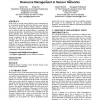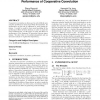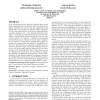GECCO
2006
Springer
15 years 5 months ago
2006
Springer
This paper studies the effectiveness of multiobjective genetic and evolutionary algorithms in multiscaling excited state direct dynamics in photochemistry via rapid reparameteriza...
101
click to vote
GECCO
2006
Springer
15 years 5 months ago
2006
Springer
Learning goal-scoring behaviour from scratch for simulated robot soccer is considered to be a very difficult problem, and is often achieved by endowing players with an innate set ...
105
click to vote
GECCO
2006
Springer
15 years 5 months ago
2006
Springer
Evolutionary algorithms tend to produce solutions that are not evolvable: Although current fitness may be high, further search is impeded as the effects of mutation and crossover ...
119
click to vote
GECCO
2006
Springer
15 years 5 months ago
2006
Springer
In this work we consider energy-efficient resource management in an environment monitoring and hazard detection sensor network. Our goal is to allocate different detection methods...
137
click to vote
GECCO
2006
Springer
15 years 5 months ago
2006
Springer
Cooperative coevolution is often used to solve difficult optimization problems by means of problem decomposition. Its performance on this task is influenced by many design decisio...
104
click to vote
GECCO
2006
Springer
15 years 5 months ago
2006
Springer
The population size in evolutionary computation is a significant parameter affecting computational effort and the ability to successfully evolve solutions. We find that population...
129
click to vote
GECCO
2006
Springer
15 years 5 months ago
2006
Springer
The importance of mutation varies across evolutionary computation domains including: genetic programming, evolution strategies, and genetic algorithms. In the genetic programming ...
132
click to vote
GECCO
2006
Springer
15 years 5 months ago
2006
Springer
Our human body is well protected by antibodies from our biological immune system. This protection system matured over millions of years and has proven its functionality. In our re...
134
click to vote
GECCO
2006
Springer
15 years 5 months ago
2006
Springer
Many metaheuristics have difficulty exploring their search space comprehensively. Exploration time and efficiency are highly dependent on the size and the ruggedness of the search...
129
click to vote
GECCO
2006
Springer
15 years 5 months ago
2006
Springer
This paper presents a methodology for using heuristic search methods to optimise cancer chemotherapy. Specifically, two evolutionary algorithms - Population Based Incremental Lear...




